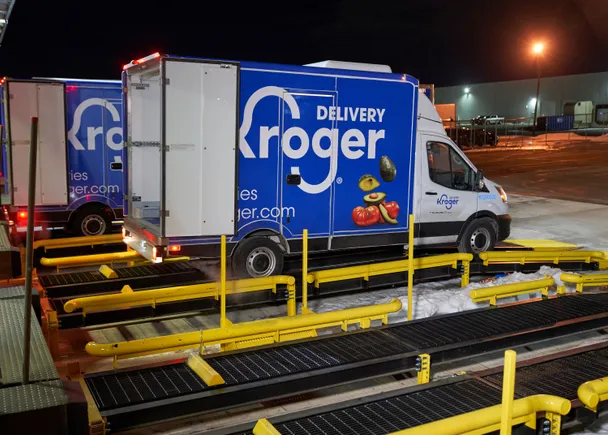Dive Brief:
- Kroger posted $33.9 billion in sales during the second quarter, a level that was essentially flat compared with the same period in 2023, the grocer reported Thursday. Identical sales growth excluding fuel came in at 1%.
- The company recorded a profit during Q2 after generating a loss during the second quarter of 2023 stemming in part from an opioid settlement. Kroger said it now expects same-store sales growth for 2024 to fall in the range of 0.75% to 1.75%, up from its previous guidance of 0.25% to 1.75%
- The earnings report likely represents the final public look at Kroger’s financial performance before a federal judge rules on the Federal Trade Commission’s bid to block the company’s planned merger with Albertsons.
Dive Insight:
Kroger made the case in its earnings release that its ongoing efforts to lower prices are propelling a virtuous cycle that helps shoppers save money while also enabling investors to make a profit. Reducing costs for consumers helps the company improve efficiency while also boosting its alternative profit businesses, which rely on data and traffic from its retail operations, according to the grocer.
“This flywheel enables Kroger to deliver exceptional value for customers and investing in our associates, and by doing so, we are well-positioned to generate attractive and sustainable returns for shareholders,” Chairman and CEO Rodney McMullen said in a statement.
The company has presented its goal of bringing down costs for shoppers as a central tenet of the merger plan, and McMullen reiterated that point on Thursday as he presented an air of confidence about the company’s ability to see the embattled transaction through to completion. Kroger and Albertsons have been facing off against regulators since late August in a trial expected to wrap up in the coming days.
“As the preliminary injunction trial with the FTC nears its conclusion, we are confident in the facts and the strengths of our position,” McMullen said Thursday during an earnings call. “As I have said before, we remain committed to closing the merger, because it will provide meaningful and measurable benefits for customers, associates and communities across the country, and we look forward to bringing these commitments to life.”
McMullen also nodded during the call to the possibility that the judge could grant the FTC’s request for an order to halt the merger. “Regardless of the outcome of the trial, Kroger is operating from a position of strength, and we are optimistic about our future. Our business is more diverse than ever, and our value creation model provides us with multiple ways to drive sustainable growth,” he said.
Kroger has seen shoppers become tighter with their spending in recent months, and the company has responded by taking steps to keep prices down, McMullen said. Customers have been buying lower-cost cuts of meat and concentrating more on essential goods as they struggle to manage their budgets, he noted.
Revising the lower end of its identical sales guidance underscores the strength Kroger feels it has in reaching price-conscious shoppers. Over 90% of households that made purchases from Kroger during Q2 bought private label products, McMullen said. The grocer added 223 new private label items to its assortment during the quarter, in part by expanding its Smart Way line of budget-priced products, according to the earnings release.
While Kroger’s quarterly sales barely budged year over year and same-store sales moved up only incrementally, the company was able to bounce back from the earnings shortfall it posted during the second quarter of 2023. During that period, the company took a $1.4 billion charge related to opioid claims and dealt with the impact of its decision to stop working with pharmacy benefits manager Express Scripts.
Kroger brought in an operating profit of $815 million during its latest quarter, which ended Aug. 17, compared with a $479 million quarterly loss a year ago.
Kroger’s e-commerce sales rose 11% during Q2, led by 17% growth in delivery, Interim CFO Todd Foley told investors. Pickup sales grew 10%, he said. The company has used artificial intelligence to improve its ability to fulfill online orders, which has helped reduce costs, Foley added.
Catherine Douglas Moran contributed reporting.

